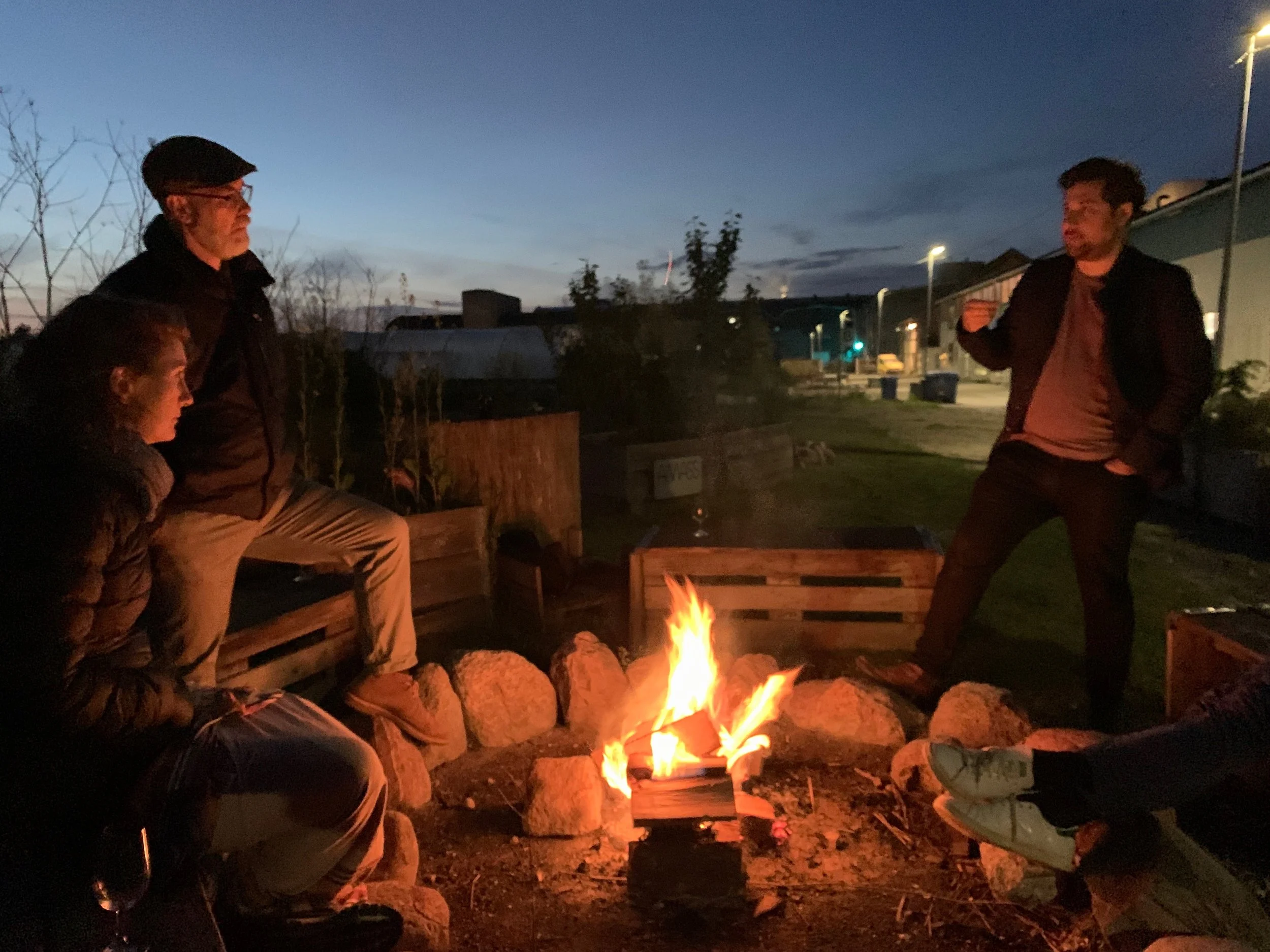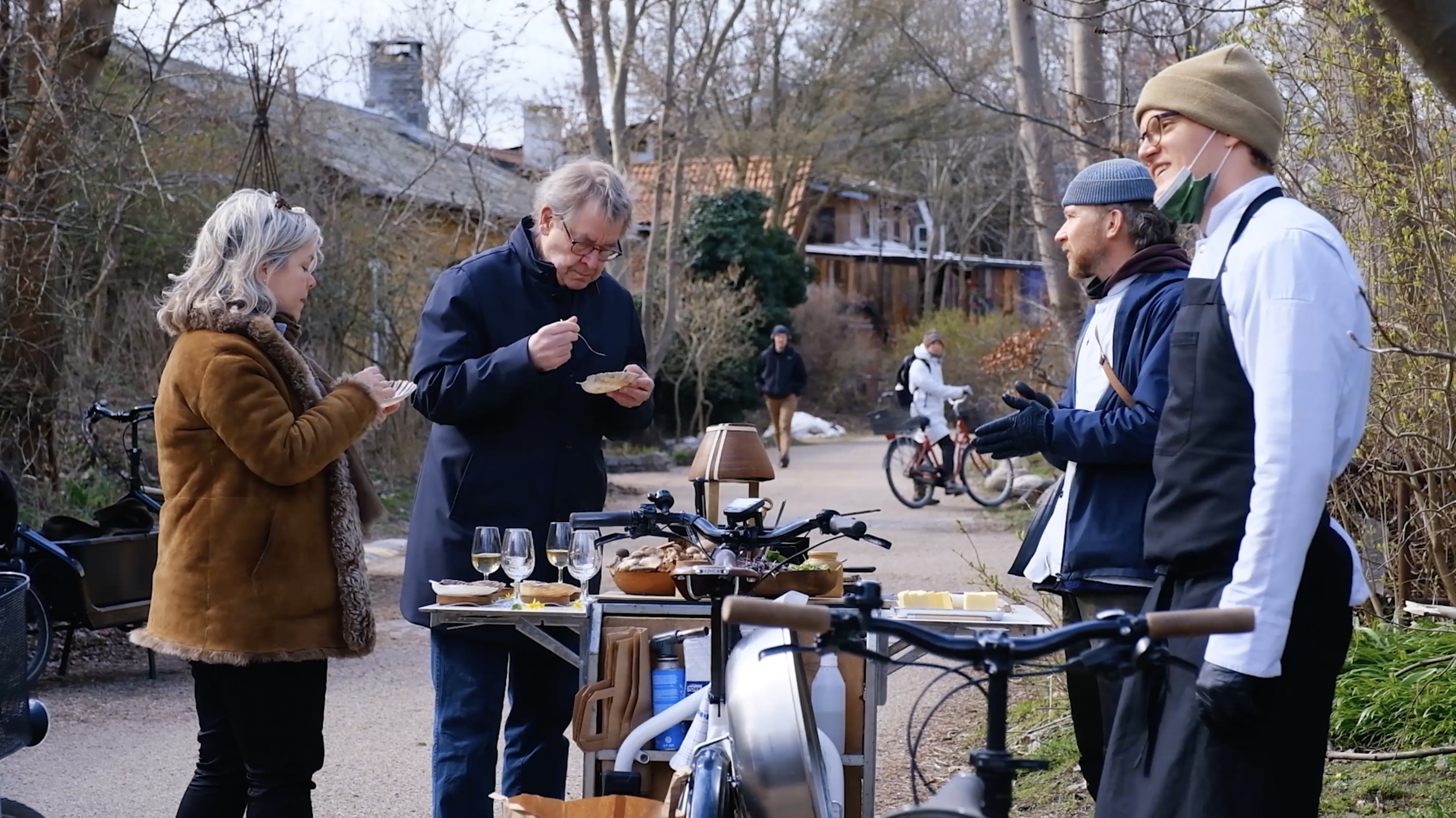“Almost like the dark web”
How Bowline unites restaurants around the industry’s difficult conversations
What began as an acute response to the COVID-19 crisis turned out to hold a potential and much-needed platform for new conversations and collaborations in the restaurant business. Dive into this uplifting account on what happens when chefs, restaurant owners, university researchers, and other stakeholders join each other in honest and open dialogue.
Tekst af Marin Lysák fra Københavns Universitet, Nicole Ferry og Eric Guthey fra
Copenhagen Business School - medstiftere af Bowline. Topvideo af Molly Grønberg
“I see Bowline as almost like the dark web.”
The words from Matt Orlando, chef and owner of Amass restaurant, might not sound too flattering on the surface. And of course Orlando doesn’t mean to associate Bowline - the group he helped start to support the restaurant industry during the early days of COVID-19 - with any illicit activities that might be taking place in the shadier regions of the internet.
But the thought of Bowline as an open, constructive and informal space where you are able to talk about everything was one of the things that appealed to him. A platform that would enable and encourage people from the food industry to collaborate and communicate openly – especially on issues that the industry might normally struggle to address.
“It’s a place where difficult and uncomfortable conversations can happen that the mainstream industry maybe doesn't want to talk about – but that are key in order to push the industry forward,” as Matt Orlando puts it.
Bowline came together in the early spring of 2020 as a small network of chefs, restaurant owners, university researchers, and other industry stakeholders. Since then, the initiative has grown organically and developed into a movement that works way beyond the COVID context it started in, and now aims to tackle broader challenges in the industry. From securing more financial stability in an industry with notoriously low margins and improving work issues associated with gender, diversity and leadership, to supporting and developing sustainable food systems and much more.
The story of Bowline is not one of grand leadership visions and clearly defined strategic goals. It is rather the story of a group of concerned friends and connections who started talking on Zoom during the first lockdown. A mix of trial and error in the face of desperation, learning in a context of extreme uncertainty, and collaborating rather than competing across a tightly-knit industry.
Danish kitchens orchestrate high levels of craft, quality, diversity, collaboration, and peak performance from which other kinds of teams and organizations both in and out of the food industry can learn so much. Key participants in Bowline are at the forefront of making restaurants as well as the whole food system more sustainable and responsible – both in terms of environmental impact, working conditions and kitchen cultures.
What is Bowline?
Bowline is a small group of chefs, restaurant owners, other restaurant industry stakeholders, and university researchers who started meeting together to respond to the COVID-19 crisis in the spring of 2020.
The group aims to help restaurants, and those who work in and around them, to survive the crisis and thrive into the future by cultivating network ties, generating research, and promoting small group problem-solving.
Partnerships emerged between Bowline and the university initiatives CBS Kontinuum and FoodSHIFT2030; an EU-funded innovation action project, transforming the European food system toward a sustainable, low carbon, circular future, including a shift to less meat and more plant-based diets.
A bowline is a so called essential knot. An ancient and simple knot used to form a fixed "eye" at the end of a rope. It has the virtues of being both easy to tie and untie; most notably, it is easy to untie after being subjected to a load…
An already fragile industry confronts a global pandemic
In March 2020, the Danish government was among the first in Western Europe to try to stop the spread of the COVID-19 virus by imposing a set of restrictions that included forbidding restaurants to seat and serve guests. It quickly became clear that restaurateurs needed to share information and collaborate to survive, but reliable networks were hard to come by, and events were moving fast. Matt Orlando recalls that “everyone was just looking for answers and information.”
But most conversations on how restaurants should respond to the lockdowns were happening in isolation rather than collectively as an industry. It was these isolated
conversations that the initial group behind Bowline tried to connect by creating a platform for people to get together and share information online.
“It’s a very fragile industry, and we don't have a lot of liquidity. A slow night is very significant to us,” points out Kamilla Seidler, chef and co-owner of restaurant Lola. “But the communication in the industry is very much a matter of not revealing your mistakes or your faults or how much you’ve lost. So I think Bowline has given us the opportunity to be more honest than we would have been otherwise.”
This openness and de-stigmatization was important to promote during a time where restaurants were struggling to survive and needed more than ever to share knowledge and experience in order to adapt to a harsh new reality.
“It’s a very fragile industry, and we don't have a lot of liquidity. A slow night is very significant to us. But the communication in the industry is very much a matter of not revealing your mistakes or your faults or how much you’ve lost. Bowline has given us the opportunity to be more honest than we would have been otherwise.”
— Kamilla Seidler, chef and co-owner of restaurant Lola
Leaderless collaboration
To promote the goal of an open and constructive dialogue, Bowline has no formal leaders and no formal industry or academic backing. It equally includes everyone with connection to the industry, from chefs and restaurant owners to university researchers—“a balance between academia and restaurants,” as Nick Curtin, chef and co-owner of restaurant Alouette, describes it. And even though the unconventional nature and flat structure of the organisation may seem hard to grasp for some, Matt Orlando sees the diverse and open structure of Bowline as a strength and an ideal environment to promote better communication and collaboration in the industry.
“Other groups I've been involved with in the past have been so bogged down by bureaucracy that just makes things go so slow.
With Bowline, it's like an even playing field, and everyone has been so open to trying new stuff just to try. That way of working is so attractive for me because it's really how we work at Amass and many other restaurants,” he explains.
The approach has worked. More and more members have engaged in conversations to share important knowledge and experiences. For example, in the spring of 2020, an online survey Bowline conducted with the help of student volunteers from Copenhagen Business School amassed more than 4500 responses from 25 countries in under 72 hours, providing massive amounts of valuable information and driving home the point that interconnectivity and collaboration is a key part of developing the industry—both in relation to the COVID crisis and beyond.
From COVID to broader issues
Initially, the work in Bowline had a necessary focus on short term issues related to the pandemic. But conversations quickly and naturally started growing in other directions as well. As time passed, the goals of Bowline expanded to tackle more general and long lasting issues in the industry as a whole.
Just before the second lockdown in 2020, Bowline began hosting workshops for the restaurant community. The first one, “Winter is Coming,” focused on the financial challenges facing restaurants during the pandemic. The second one, “Everyone Has a Story: Let’s Change the Narrative,” brought relevant stakeholders together to tackle the current public debate on gender bias and harassment and how the industry can contribute to and learn from it. This was a quintessential Bowline event – a conversation highly relevant to an industry with rough working conditions for many women, and without much organized work being done to address the issue.
Partly inspired by these conversations, five CBS students conducted master’s thesis projects investigating similar industry issues and concerns. These include an overview of industry responses to the crisis; an in-depth case study of one establishment’s response; a study of diversity and sexual harassment issues facing the industry; and a project tracking an attempt to promote closer collaboration between Copenhagen restaurants and local/organic farmers and food suppliers.
These kinds of activities have generated significant momentum to start tackling some of the persistent challenges facing the restaurant industry in a more organized way. Now that the urgency of the pandemic is starting to subside, Bowline needs to figure out ways to keep that momentum going.
A seat at the table – returning to restaurants
The survey was set up in collaboration between Bowline and student volunteers from Copenhagen Business School.
The expectation was a few hundred respondents, but in just 72 hours 4500 people had responded from 25 countries. Here’s the story they told:
People who care about restaurants care a very great deal about them. While concerned about COVID, respondents wanted restaurants to open again, and wanted to support them when they did.
Respondents were already very knowledgeable about the science and the risks, and continued to educate themselves.
The survey, and especially the fact that people responded from 25 different countries around the world, drove home the point that interconnectivity and collaboration is key.
“What's the worst that could happen?”
The lockdowns are over, but many restaurants are still fighting for financial survival. Businesses are open again, but the slow winter season is about to hit. On top of that, the severe labor shortage plaguing the entire service industry after two lockdowns means the employees that restaurants do have are under considerable stress. Meanwhile enrollment figures at the Copenhagen hospitality school are significantly lower and longer-term prospects for the industry are uncertain. The members of Bowline want to continue to address these challenges and more.
Over the summer of 2021, Bowline orchestrated three events called “City Lights” in collaboration with Copenhagen Business School and Wonderful Copenhagen. Since meetings with more than five people in one place were out of the question, they hosted individual, curated walk-and-talks with no more than two or three people at a time. 75 different chefs, artists, architects, journalists, historians, politicians, scholars, and community leaders were brought together to discuss the effects of the lockdown on the urban community, and just as importantly to look forward, discussing how we continue to cultivate the role of restaurants as central institutions in the cultural and civic fabric.
With those conversations in mind, Bowline now looks to new challenges in a post-lockdown world. After starting as a small group, the plan is to raise money, to grow, and to engage and benefit the restaurant sector and communities across Denmark. There is still a big need for change in the industry, and as Bowline has demonstrated, collaboration and openness are some of the keys to promoting change on a larger scale.
In mid-November at Amass, Orlando will host a working dinner and roundtable discussion forum that will bring together stakeholders from Bowline, CBS Kontinuum, and FoodSHIFT2030 to figure out collectively how to continue moving industry-specific issues forward. When asked if he wanted to continue working on new ways to engage the restaurant scene in collaborations, Matt Orlando made his feelings clear:
“What's the worst that could happen? It doesn't work? Then we go back to what we were doing before and that’s fine. But if you don't take those chances and the chances of possibly failing, you will never find alternative ways to do things.”





